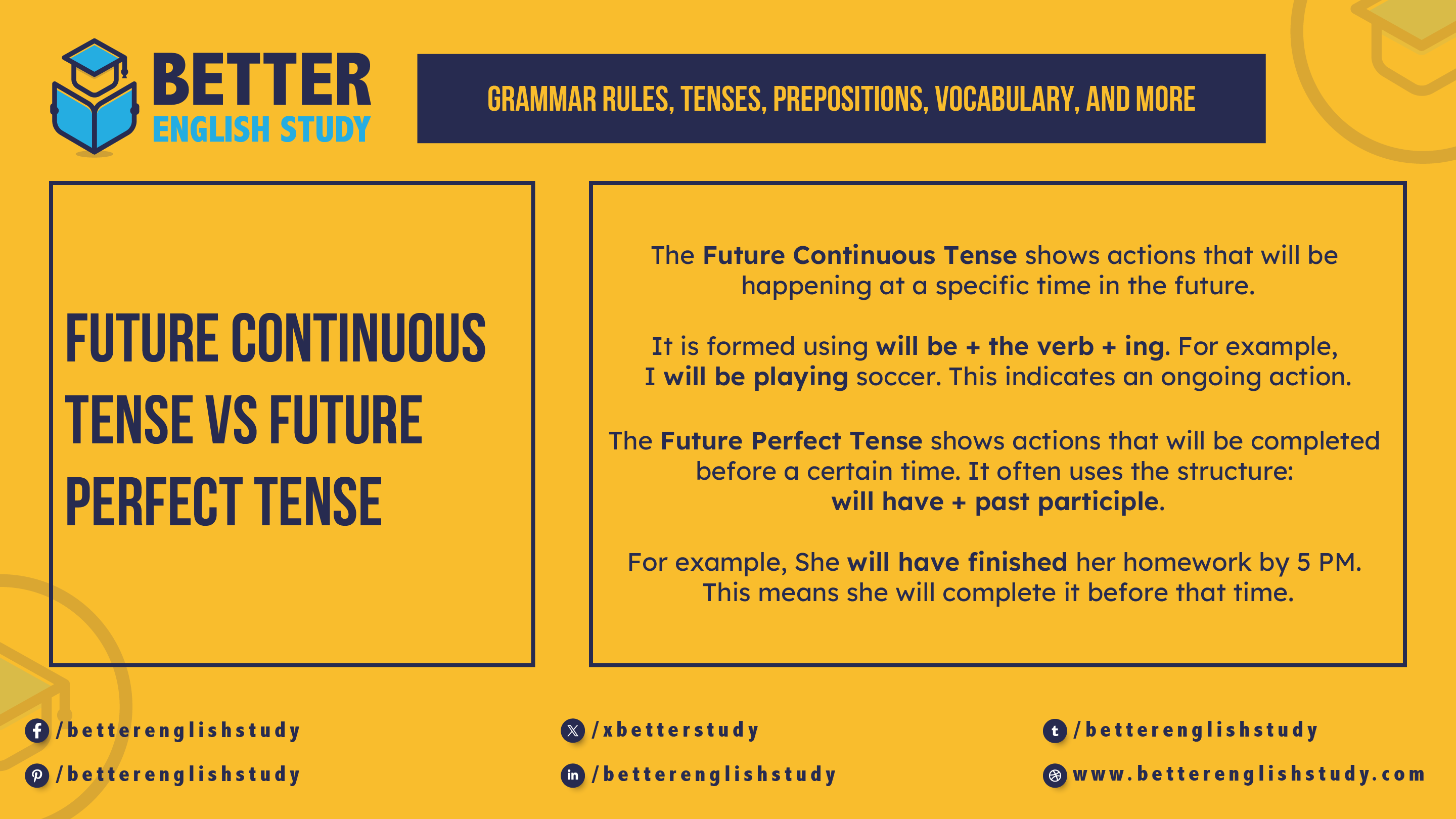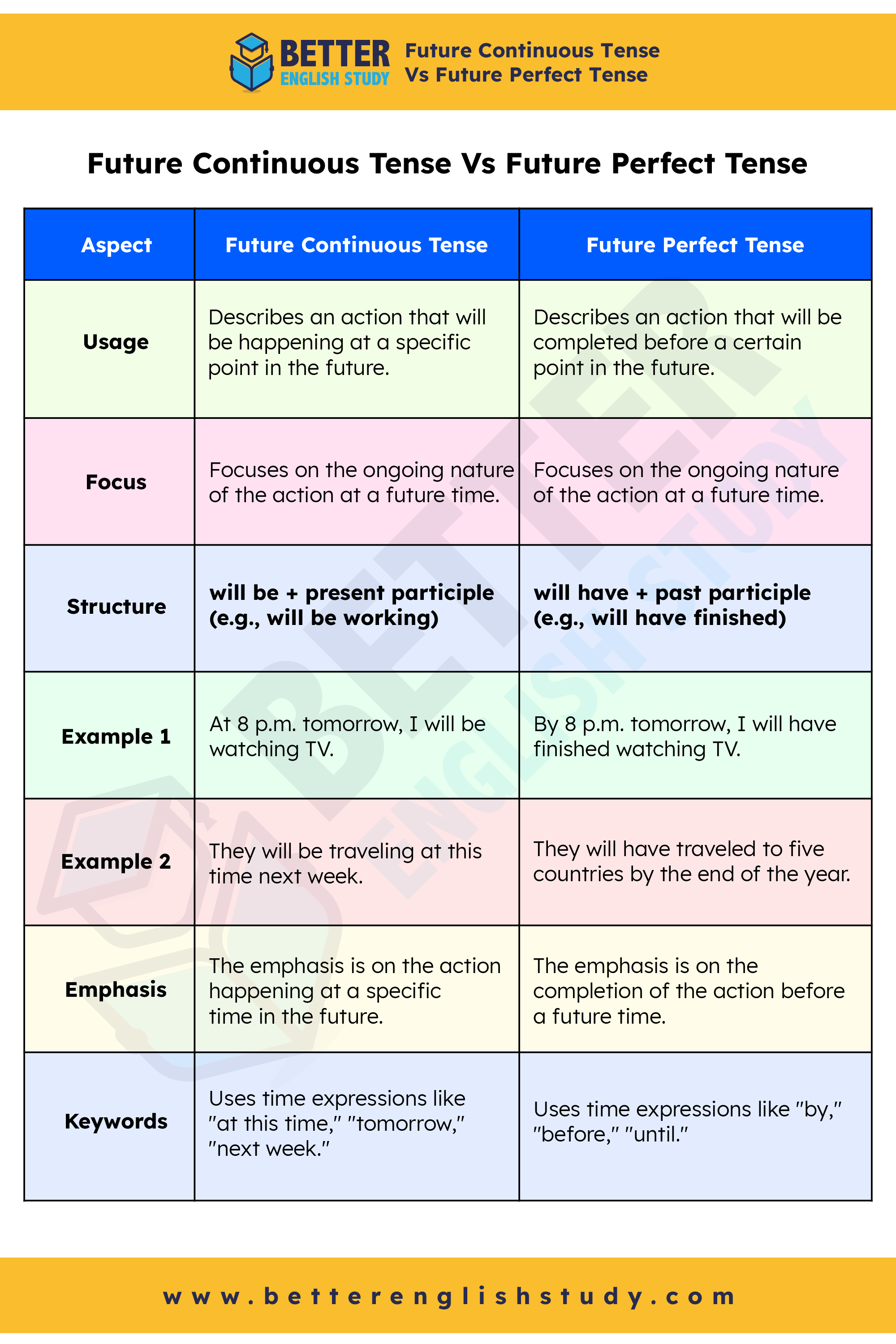
The Future Continuous Tense describes actions that will be ongoing at a specific time in the future, while the Future Perfect Tense indicates actions that will be completed before a certain point in the future. For example, “I will be studying at 8 PM” (Future Continuous) versus “I will have finished my homework by 8 PM” (Future Perfect).
Understanding verb tenses is crucial for clear communication. The Future Continuous Tense emphasizes ongoing actions, while the Future Perfect Tense highlights completed actions. Mastering these tenses enhances your writing and speaking skills. Whether you’re crafting an essay or engaging in conversation, using the correct tense keeps your message precise.
This distinction plays a vital role in effective language use, making it essential for learners of all levels.
Introduction To Future Tenses
Understanding future tenses helps in expressing time clearly. The future continuous tense shows actions that will be ongoing in the future. For example, “I will be playing soccer at 3 PM.” This indicates an action that is happening at a specific future time.
The future perfect tense describes actions that will be completed before a certain time. For instance, “I will have finished my homework by 5 PM.” This emphasizes the completion of an action before another future point.
Both tenses serve unique roles in communication. Future continuous focuses on ongoing actions, while future perfect highlights completion. Understanding these differences enhances clarity in conversations.
Core Concepts Of Future Continuous Tense
The Future Continuous Tense shows actions that will be happening at a specific time in the future.
It is formed using “will be” + the verb + “ing.” For example, “I will be playing soccer.” This indicates an ongoing action.
Use the Future Continuous Tense to express future actions that will last for some time. It can describe planned events or actions in progress. For instance, “They will be studying at 8 PM.” This shows their action during that time.
Common phrases include “at this time” or “during that period.” These phrases help clarify the time of the action. Remember, the Future Continuous Tense emphasizes ongoing activities in the future.
Example sentences
- I will be studying for my exams tomorrow evening.
- She will be traveling to New York next week.
- They will be playing soccer at the park this time tomorrow.
- We will be having dinner at 7 p.m. tonight.
- He will be working late at the office next Friday.
- This time next year, I will be living in a different city.
- She will be attending a meeting when you arrive.
- At 8 p.m., we will be watching a movie together.
- He will be sleeping when you get home.
- They will be moving to a new house next month.
Diving Into Future Perfect Tense
The Future Perfect Tense shows actions that will be completed before a certain time. It often uses the structure: will have + past participle.
For example, “She will have finished her homework by 5 PM.” This means she will complete it before that time.
Another example is, “They will have arrived by noon.” This indicates they will be there before noon arrives.
To form this tense, identify the subject, add will have, and then the past participle of the main verb.
Using this tense helps express actions that are certain to complete in the future.
Example sentences
- By next week, I will have finished my project.
- She will have graduated by the end of this year.
- They will have left the party before you arrive.
- He will have completed his work by the time you call.
- We will have moved to a new city by this time next year.
- By 10 p.m., I will have cooked dinner for everyone.
- She will have saved enough money to buy a car by December.
- He will have repaired the bike before the weekend.
- By the time you get home, they will have eaten all the cake.
- We will have traveled to five different countries by the end of the trip.

Key Differences At A Glance
| Aspect | Future Continuous Tense | Future Perfect Tense |
|---|---|---|
| Usage | Describes an action that will be happening at a specific point in the future. | Describes an action that will be completed before a certain point in the future. |
| Focus | Focuses on the ongoing nature of the action at a future time. | Focuses on the completion of the action by a specific future time. |
| Structure | will be + present participle (e.g., will be working) | will have + past participle (e.g., will have finished) |
| Example 1 | At 8 p.m. tomorrow, I will be watching TV. | By 8 p.m. tomorrow, I will have finished watching TV. |
| Example 2 | They will be traveling at this time next week. | They will have traveled to five countries by the end of the year. |
| Emphasis | The emphasis is on the action happening at a specific time in the future. | The emphasis is on the completion of the action before a future time. |
| Keywords | Uses time expressions like “at this time,” “tomorrow,” “next week.” | Uses time expressions like “by,” “before,” “until.” |
In summary, the future continuous tense highlights an action in progress at a certain time in the future, while the future perfect tense emphasizes that an action will be finished by a certain point in the future.
Illustrating With Examples
The Future Continuous Tense describes actions that will be ongoing in the future.
For example, “I will be eating dinner at 7 PM.” This shows an action happening over a period of time.
Another example is, “They will be playing soccer next Saturday.” It highlights the ongoing nature of the activity.
On the other hand, the Future Perfect Tense indicates actions that will be completed by a certain time in the future.
For instance, “I will have finished my homework by 5 PM.” This emphasizes completion.
Another example is, “She will have graduated by next year.” It focuses on the end result.
Choosing The Right Tense
Choosing the right tense is important in writing. Future Continuous Tense describes actions that will be ongoing in the future. For example, “I will be studying at 8 PM.” This shows a future action in progress.
Future Perfect Tense talks about actions that will be completed before a specific time. For instance, “I will have finished my homework by 6 PM.” This indicates completion before a deadline.
Factors to consider include the action’s duration and its completion. Use the future continuous for ongoing actions. Use the future perfect for completed actions.
Common mistakes include mixing up these tenses. Ensure to recognize the context of the sentence. Misusing these tenses can confuse readers.
Frequently Asked Questions
What Is Future Continuous Tense?
Future Continuous Tense describes actions that will be ongoing at a specific time in the future. It often emphasizes the duration of an action. For example, “I will be studying at 8 PM. ” This tense showcases activities that will be in progress, making it essential for understanding future timelines.
What Is Future Perfect Tense?
Future Perfect Tense indicates actions that will be completed before a specified future time. It highlights the completion aspect of an action. For instance, “I will have finished my project by Friday. ” This tense is crucial for expressing deadlines and expectations in future scenarios.
How To Form Future Continuous Tense?
To form Future Continuous Tense, use “will be” followed by the verb’s “-ing” form. For example, “She will be traveling. ” This structure helps convey ongoing future actions effectively. It’s essential to remember that the focus is on the process, not just the completion of the action.
How To Form Future Perfect Tense?
To form Future Perfect Tense, use “will have” followed by the past participle of the verb. For example, “They will have arrived by noon. ” This construction emphasizes that an action will be completed before a future point in time, highlighting the result of the action.
Conclusion
Understanding the difference between the Future Continuous and Future Perfect tenses enhances your grasp of English grammar. Each tense serves a unique purpose in expressing time and action. By practicing with examples, you can improve your writing and speaking skills.
Mastering these tenses will elevate your overall communication.
